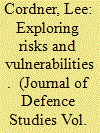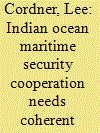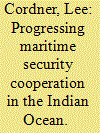|
|
|
Sort Order |
|
|
|
Items / Page
|
|
|
|
|
|
|
| Srl | Item |
| 1 |
ID:
132136


|
|
|
|
|
| Publication |
2014.
|
| Summary/Abstract |
Maritime security in the Indian Ocean Region (IOR) has become a central consideration. Shared risks and common vulnerabilities for state and non-state actors, generated by traditional and non-traditional security challenges, converge to a significant extent at sea. Risk-based approaches offer the potential for regional and extra-regional actors to engage in a constructive and non-confrontational dialogue that can assist collective security cooperation. Analyzing the evolving risk context, and assessing the risks and vulnerabilities, offers a sound basis for developing cooperative strategies for enhancing security in the maritime domain. Developing a regional strategic risk assessment, with a maritime security focus, should be a priority for IOR cooperative security entities. The Indian Ocean Rim Association (IORA) and the Indian Ocean Naval Symposium (IONS) could play significant roles in this work.
|
|
|
|
|
|
|
|
|
|
|
|
|
|
|
|
| 2 |
ID:
148433


|
|
|
| 3 |
ID:
132131


|
|
|
|
|
| Publication |
2014.
|
| Summary/Abstract |
Maritime security in the Indian Ocean Region (IOR) is a central issue for regional and extra-regional actors. Traditional and non-traditional security challenges largely converge at sea as they impact economic, environmental, energy, human, food and national security. As the major regional power and an emerging Asian great power, India's willingness and capacity to provide strategic leadership is critical to engendering a cooperative spirit of shared destiny. India's growing naval capabilities indicate a strong commitment to maritime security. However, its strategic policy ambiguity and lack of transparency undermines trust and confidence. Allegations of civil-military dissonance and the lack of political will for reform raises questions about strategic competence. India's willingness and capacity for cooperative regional security leadership presents regional risks. The new Indian government is presented with significant challenges to reform domestic politico-bureaucratic-military arrangements in order to enhance external and internal consistency and credibility, and improve openness and coherency.
|
|
|
|
|
|
|
|
|
|
|
|
|
|
|
|
| 4 |
ID:
128296


|
|
|
|
|
| Publication |
Singapore, S.Rajaratnam School of International Studies, 2013.
|
| Description |
viii, 92p.Pbk
|
| Series |
RSIS Monograph No.26
|
| Standard Number |
9789810757700
|
|
|
|
|
|
|
|
|
|
|
|
Copies: C:1/I:0,R:0,Q:0
Circulation
| Accession# | Call# | Current Location | Status | Policy | Location |
| 057684 | 622.20289095/COR 057684 | Main | On Shelf | General | |
|
|
|
|
| 5 |
ID:
115005


|
|
|
|
|
| Publication |
2011.
|
| Summary/Abstract |
The theme of the second Indian Ocean Naval Symposium (IONS), hosted in
Abu Dhabi by the United Arab Emirates (UAE) Navy on 10-12 May 2010,
was "Together for the Reinforcement of Maritime Security in the Indian
Ocean."
1
Navy chiefs of service and senior maritime security officers or their
representatives from thirty of the thirty-two Indian Ocean region (IOR) navies
and maritime security forces gathered for this significant event. Participants
from the diverse Indian Ocean littoral came from the Arabian Gulf and the Red
Sea, Africa, South Asia, Southeast Asia, and Australia.
2
Pakistan, which had declined an invitation to attend the first IONS meeting, in New Delhi in 2008, was
represented by the local air attaché. In addition, extraregional maritime force
participants included the U.S. Navy, represented by Commander, Naval Forces,
U.S. Central Command, Vice Admiral William
Gortney, and the Deputy Chief of Naval Operations,
Vice Admiral Bruce W. Clingan; the Italian Navy, represented by its chief, Admiral Bruno Branciforte; and
the Royal Navy of the United Kingdom, which sent a
senior delegation. Notable was the absence of participants from the navies of other external countries with
significant and growing interests in the IOR, for example, China, Russia, Japan, and the Republic of
Korea.
|
|
|
|
|
|
|
|
|
|
|
|
|
|
|
|
| 6 |
ID:
130874


|
|
|
|
|
| Publication |
2014.
|
| Summary/Abstract |
Maritime security in the Indian Ocean Region (IOR) has become a paramount consideration; a range of traditional and non-traditional security challenges largely converge at sea. Risk-based processes offer the potential to engage in a positive, constructive and non-confrontational approach that will help to identify collective and cooperative security strategies. Analysing the evolving maritime security risk context provides a powerful tool for understanding common risks and vulnerabilities that affect regional and extra-regional actors with interests in the IOR. This can provide the impetus for diverse actors, primarily states, to cooperate to advance common objectives and protect shared interests without significantly compromising territorial integrity or sovereignty, against a range of risks that no single actor has the ability to mitigate. Commissioning a multinational, multi-disciplinary team of experts to conduct a regional strategic risk assessment, with a specific focus upon maritime security, should be a priority. Maritime security cooperation in the IOR could, if managed astutely and prudently, bind a diverse and largely disaggregated region
|
|
|
|
|
|
|
|
|
|
|
|
|
|
|
|
|
|
|
|
|